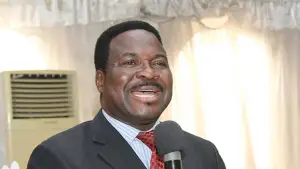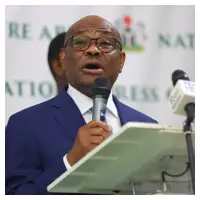Former Jigawa State governor and founding member of the Peoples Democratic Party (PDP), Sule Lamido, has revealed how the late Chief Bola Ige openly challenged northern politicians over their commitment to opposing General Sani Abacha's military regime.
In his recently published autobiography, 'Being True To Myself', unveiled on May 13, Lamido recounts a significant confrontation that occurred during early efforts to unite against the Abacha government.
According to Lamido, Bola Ige expressed deep mistrust toward northern members of the original nine-person group known as the G9—a coalition tasked with laying the foundation for what would later become the PDP.
The G9, which included prominent figures such as ex-Vice President Alex Ekwueme, Senator Francis Ellah, and Lamido himself, had convened at 9 Raymond Njoku Street, Ikoyi, Lagos, to strategize after their political parties were denied registration by the Abacha administration.
Lamido recalled a heated moment when Ige interrupted the discussion and directly confronted the northern members, saying: "Look, Sule, before going into details about this G9... your collective position on many issues within the last few years has revealed that the North responds as one entity. The North has an agenda and, therefore... I don't trust you. You are trying to use us to create a kind of moral force, a national momentum, but you have a private agenda behind it. Otherwise, if you want me to believe you, go back to the North and create a fresh group to challenge Abacha's military government. Only if you do that will I believe you."
In response to Ige's challenge, Lamido admitted, "We agree, you are right." He explained that many Nigerians at the time viewed Abacha as a symbolic representative of the North, which fueled doubts about northern politicians' genuine opposition to his regime.
Following this confrontation, Lamido revealed that the northern members returned home to form their own pressure group dedicated to challenging Abacha's military government. This new coalition included diverse voices such as university lecturer Dr. Usman Bugaje and retired Colonel Dangiwa Umar.
However, Lamido noted that some influential northern leaders, including ex-Kaduna State governor Balarabe Musa and Chief Sunday Awoniyi, declined to join the movement.
The revelations provide a rare glimpse into the complex political dynamics that shaped Nigeria's transition from military rule to democracy and the early formation of what would become one of Nigeria's dominant political parties.













